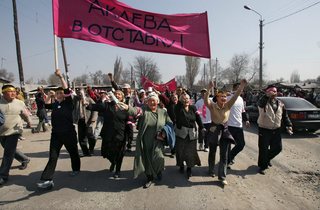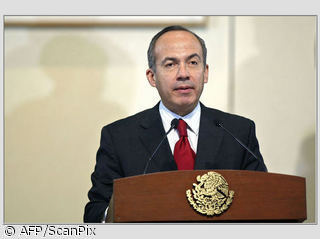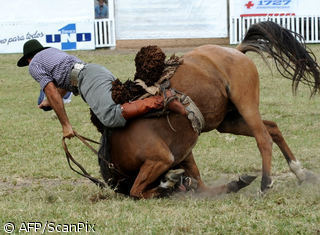Faced with a 2004 deadline, Latvia's government must decide what to do with thousands of secret police files left over from Soviet rule of the Baltic country
Published:
12 July 2003 y., Saturday
Since regaining independence in the 1991 Soviet collapse, the country of 2.4 million has grappled with its Communist past and what to do with thousands of KGB documents that are a record of decades of secret police activity.
Some want the 4,000 KGB files opened for public view, citing their historical importance, while others want them destroyed, fearful of the secrets they contain. The KGB took the bulk of the files with them when they pulled out of Latvia in 1991. Those that remain are just a fraction of the total.
If the deadline passes without a decision, the files will remain locked up -- closed to all but prosecutors investigating specific crimes and to individuals who want to see their own files. The files could no longer be used to run background checks on public figures or job applicants.
"Let's put the information on the table and get rid of the speculation," ex-Latvian Prime Minister Guntars Krasts told The Associated Press. "We can't live with keeping it in the dark and some people speculating over who is and isn't in there."
While giving the public access could clear those who are rumored to have worked for the KGB during Soviet rule, it could also mean others might be wrongly tainted.
Former Latvian President Guntis Ulmanis said the files should be destroyed, arguing that the KGB was known to forge documents in a bid to smear public figures.
The files have typically been used to run background checks on people seeking public office or a job in law enforcement. Any use of the documents was done through the state-run Center for the Documentation of the Consequences of Totalitarianism.
If someone is found to have had connections to the KGB, they can't be hired.
Indulis Zalite, who oversees the storage of the files and one of the few with unfettered access to them, said destroying them would be a mistake, but so would opening them up, too.
Šaltinis:
newsday.com
Copying, publishing, announcing any information from the News.lt portal without written permission of News.lt editorial office is prohibited.
The most popular articles
 Civil unrest in Kyrgyzstan last week left over 70 people dead, more than 1500 injured and over 500 hospitalized.
more »
Civil unrest in Kyrgyzstan last week left over 70 people dead, more than 1500 injured and over 500 hospitalized.
more »
 After lots were drawn, ten winners of Danske Bankas scholarships and one winner of an iPod shuffle player were established.
more »
After lots were drawn, ten winners of Danske Bankas scholarships and one winner of an iPod shuffle player were established.
more »
 The health of Chinese civil rights activist Hu Jia is causing real fears after reports that the winner of the Parliament's 2008 Sakharov human rights prize is ailing with liver disease.
more »
The health of Chinese civil rights activist Hu Jia is causing real fears after reports that the winner of the Parliament's 2008 Sakharov human rights prize is ailing with liver disease.
more »
 Nestled in the northeast plains of India, Bihar is one of the poorest states in the country. Its per capita income is just a fraction of that in other Indian states.
more »
Nestled in the northeast plains of India, Bihar is one of the poorest states in the country. Its per capita income is just a fraction of that in other Indian states.
more »
 One day after a 7.2 magnitude earthquake rattled the Mexico-California border area, Mexico‘s President visits one of the affected areas.
more »
One day after a 7.2 magnitude earthquake rattled the Mexico-California border area, Mexico‘s President visits one of the affected areas.
more »
 Roma communities, the European Union’s largest ethnic minority, continue to face persistent discrimination and segregation.
more »
Roma communities, the European Union’s largest ethnic minority, continue to face persistent discrimination and segregation.
more »
 This the sound of spring for many in Latvia. With a little guidance from their parents, children at the Riga Zoo made bird boxes in anticipation of the returning migrating birds.
more »
This the sound of spring for many in Latvia. With a little guidance from their parents, children at the Riga Zoo made bird boxes in anticipation of the returning migrating birds.
more »
 Economic shocks are taking a toll on a population already facing high risks in low-income countries: children.
more »
Economic shocks are taking a toll on a population already facing high risks in low-income countries: children.
more »
 As celebrations for Easter week get under way millions of the faithful will be heading to Churches across Europe to mark the crucifixion and resurrection of Christ.
more »
As celebrations for Easter week get under way millions of the faithful will be heading to Churches across Europe to mark the crucifixion and resurrection of Christ.
more »
 More than 200, 000 riders and their horses are in Uruguay’s capital for South America’s largest rodeo.
more »
More than 200, 000 riders and their horses are in Uruguay’s capital for South America’s largest rodeo.
more »